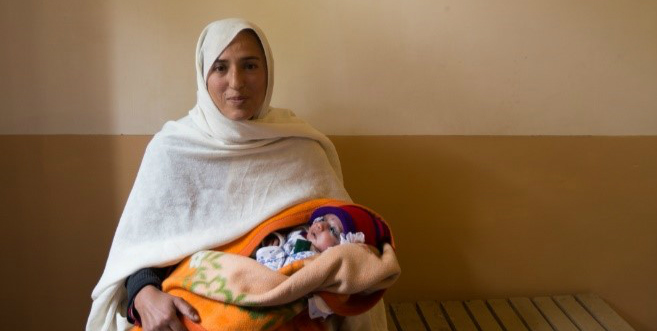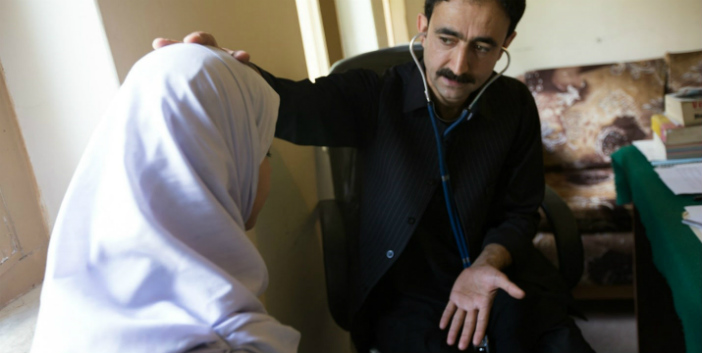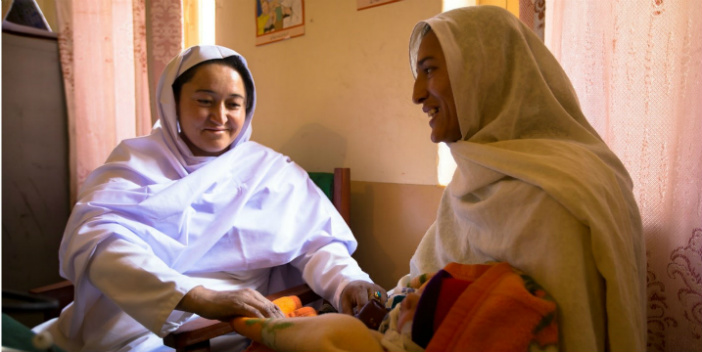
Four years ago, Laya Hoor took a walk through the village of Ghulmet, on the banks of the Hunza River. The craggy peaks of northern Pakistan’s mountain ranges rose around her on all sides, so high that they skimmed the clouds drifting by.
But Laya wasn’t walking to stretch her legs and take in the scenery. She was traveling on foot to visit her local health worker – in labour with her first child.
Without a private delivery room or appropriate medical equipment at the local clinic, Laya had chosen to deliver her baby at a health worker’s home, becoming one of the millions of women around the world who give birth without proper medical facilities.
“We did not have a single labor room and because of that, patients used to avoid having deliveries in the hospital,” says Dr. Shahzaman, the chief medical officer at the clinic in Ghulmet. “This caused many untimely deaths.”

Dr. Shahzaman conducts a regular check-up with one of his patients at the health post in Ghulmet.
In 2015, an estimated 300,000 women died due to complications in pregnancy and childbirth, according to the World Health Organization (WHO).
Although Laya delivered her second baby in 2015, she was one of the lucky ones. This time, she gave birth in a private delivery room at the health post in Ghulmet, surrounded by the necessary medical equipment to ensure the best chances for her and her new baby.
The clinic was upgraded with the support of Aga Khan Foundation Canada, as part of a program to improve health services for pregnant women and their children in remote, hard-to-reach areas.

Laya brings her second child to a check-up with her health worker, Nusrat Shaheen, at the local health post.
Since 2011, AKFC’s maternal, newborn, and child health programming has reached more than 4.5 million people in five countries – Afghanistan, Mali, Mozambique, Pakistan, and Tanzania – with the support of Global Affairs Canada.
AKFC tackles the challenge of poor maternal and child health on multiple fronts: training health professionals and community leaders; building or upgrading health facilities in remote areas; supporting better food security and nutrition; using communications technologies to link isolated communities with world-class medical care; and empowering women and men with the knowledge, skills, and resources to provide a healthy start for all children in their communities.
Some of the impacts include:
- More than 4,000 community health workers in Mali, Mozambique, and Pakistan were identified, trained and supported to provide quality maternal and child health services in underserved areas.
- Thanks to a growing cadre of trained midwives and female health workers in northern Pakistan, 90 percent of mothers in program areas are now aware of best infant feeding practices, compared to 59 per cent in 2012.
- Over 19,000 children under five received treatment for severe acute malnutrition at 11 health facilities in northern Afghanistan. More than 12,000 pregnant women and 5,000 breastfeeding women also received nutrient supplements and treatment for acute malnutrition.
- In Bamyan province, in northern Afghanistan, a small district hospital — where 15 out of 35 beds were in tents — is being transformed into a modern, 100-bed health facility offering a wide range of services. The completed hospital expansion will bring world-class facilities to some 400,000 Afghans — 70% of whom are women and children – by the end of 2016. Click here to learn more about the new Bamyan Hospital.
- In Mali, 97 communities came together to build new birthing centres. AKFC ensured that the communities had the necessary equipment and essential supplies to operate these centres, and provided training for more than 2,000 midwives and other community health workers.
- In 41 remote communities in Mozambique, bicycle and motorcycle ambulances now stand ready to provide life-saving transportation during obstetric emergencies.
- In 15 districts of Tanzania, over two million people saw improvements to access and quality of maternal and child health services.
To learn more about maternal, newborn, and child health, visit akfc.ca.
